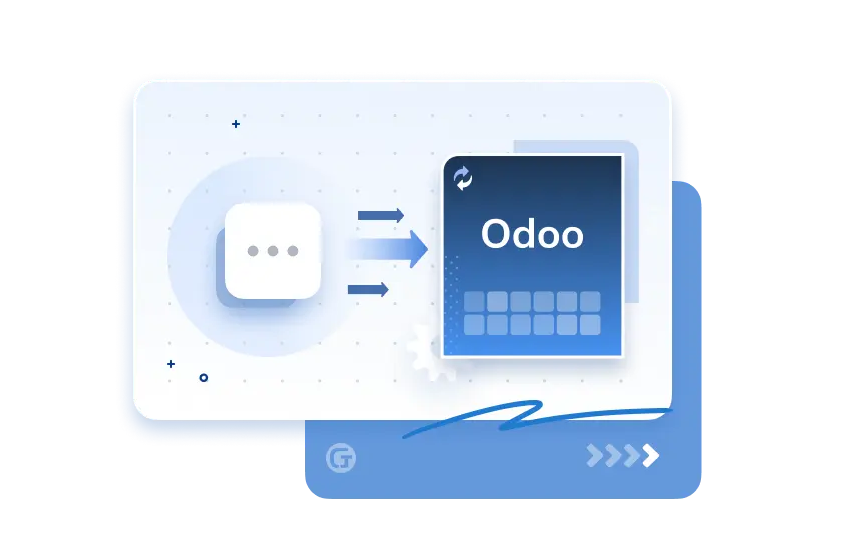In today’s fast-paced digital economy, businesses must operate efficiently and intelligently across all departments—from managing customer relationships and human resources to ensuring accurate financial tracking and reporting. Traditional siloed systems no longer meet the demands of modern business. This is where Odoo integration emerges as a powerful enabler of efficiency and strategic alignment across your enterprise systems.
Odoo, an open-source ERP (Enterprise Resource Planning) platform, provides a wide array of business applications including CRM, HR, and Accounting. When integrated effectively, it transforms fragmented operations into a streamlined, intelligent ecosystem. In this article, we will explore how Odoo ERP integration can dramatically improve your Customer Relationship Management (CRM), Human Resources (HR), and Accounting processes—and why companies are increasingly turning to Odoo integration services to stay ahead of the competition.
What is Odoo Integration?
Odoo integration refers to the process of connecting Odoo with various internal and external applications, databases, and tools to ensure seamless data flow, process automation, and operational consistency across different business units. Whether you are integrating with third-party apps (e.g., Salesforce, QuickBooks, Slack) or with other Odoo modules (e.g., CRM + Accounting + HR), integration helps create a unified digital infrastructure.
Benefits of Odoo Integration:
- Real-time data synchronization
- Elimination of duplicate data entry
- Enhanced operational visibility
- Greater efficiency and automation
- Improved decision-making through consolidated insights
Let’s now dive into how Odoo ERP integration enhances your core departments—CRM, HR, and Accounting.
Enhancing Customer Relationship Management (CRM)
CRM is the backbone of customer-centric organizations. Odoo’s CRM module is powerful, and when integrated with other business functions, it becomes even more effective.
1. Centralized Customer Data
With Odoo integration, your CRM can be linked directly to marketing, sales, eCommerce, and customer service modules. This creates a 360-degree view of each customer, consolidating all interactions, transactions, and communication history into one platform.
Benefits:
- Personalized customer service
- Targeted marketing campaigns
- Enhanced lead nurturing and sales forecasting
2. Automated Lead Management
Through Odoo ERP integration, your CRM can be integrated with web forms, email marketing platforms, or social media tools. Leads generated through various touchpoints are automatically funneled into the CRM and assigned based on predefined rules.
Benefits:
- Faster lead response time
- Reduced manual data entry
- Increased sales conversions
3. Sales and Inventory Synchronization
By integrating CRM with inventory and sales modules, your sales team has real-time visibility into stock levels, pricing, and order statuses. This empowers them to make accurate offers and close deals faster.
Benefits:
- Accurate quotations
- Reduced stockouts and backorders
- Enhanced customer satisfaction
Streamlining Human Resource Management (HRM)
Human capital is one of your most valuable assets. Odoo’s HR module covers a wide range of functions such as recruitment, attendance, payroll, and appraisals. Through Odoo integration, these tasks become easier to manage and more data-driven.
1. End-to-End Recruitment Automation
With Odoo integration services, you can connect the HR module with external job boards, recruitment platforms, and email systems. This allows applications to be automatically imported, tracked, and assigned.
Benefits:
- Faster hiring process
- Centralized candidate management
- Automated interview scheduling and feedback
2. Time and Attendance Integration
Integrating biometric devices or attendance tracking software with Odoo ensures accurate employee records. Timesheets, check-ins, and overtime data are automatically pulled into the HR system.
Benefits:
- Error-free payroll processing
- Improved compliance with labor laws
- Real-time attendance insights
3. Performance and Appraisal Analytics
When HR is integrated with other modules like Projects or CRM, employee performance can be tracked more effectively. For example, sales staff performance data from CRM can inform their appraisals.
Benefits:
- Objective evaluations
- Tailored development plans
- Increased employee engagement and retention
Optimizing Accounting and Financial Operations
Financial integrity is at the core of every successful organization. Odoo’s Accounting module, when integrated properly, offers a robust platform for managing everything from invoices to taxes.
1. Real-Time Financial Reporting
Through odoo erp integration, the Accounting module can pull data from Sales, CRM, Inventory, and HR modules. This means every sale, refund, or salary payment is recorded in real time.
Benefits:
- Instant financial insights
- Streamlined audits and compliance
- Better cash flow management
2. Automated Invoicing and Payments
By integrating Odoo with eCommerce, subscription, or billing platforms, invoices can be generated automatically based on customer purchases or usage. Integration with payment gateways also enables automated payment reconciliation.
Benefits:
- Reduced manual workload
- Faster revenue collection
- Fewer billing errors
3. Tax Compliance and Multi-Currency Support
Odoo supports localization for taxes and multi-currency operations. Integration with third-party tax engines (like Avalara) ensures compliance in various jurisdictions.
Benefits:
- Accurate tax calculations
- Easier cross-border accounting
- Lower risk of tax penalties
The Power of Unified Operations
What makes Odoo ERP integration stand out is its ability to unify all major business functions under one roof. This not only eliminates the cost and complexity of managing multiple tools but also ensures everyone—from marketing to HR to finance—operates using the same source of truth.
Example Scenario:
Imagine a sales representative closes a deal in the CRM module. Through Odoo integration:
- A sales order is automatically generated in the Sales module
- Stock availability is checked in the Inventory module
- An invoice is created in the Accounting module
- Commission data is fed to the HR module for payroll processing
All of this happens seamlessly, without manual intervention—saving time, improving accuracy, and boosting productivity.
Leveraging Odoo Integration Services
While Odoo offers a strong native ecosystem, professional odoo integration services can help you take it further by:
- Customizing integrations to fit unique business needs
- Connecting Odoo with legacy systems or third-party apps
- Ensuring data security, scalability, and performance
Key Features Offered by Odoo Integration Services:
- API-based custom integrations
- Data migration and synchronization
- Middleware implementation
- Dashboard creation for unified reporting
- Post-integration support and maintenance
Businesses often underestimate the complexity of integration until errors and data silos start to surface. Partnering with a specialized Odoo integration services provider ensures a seamless experience and a faster ROI.
Conclusion
In a competitive business landscape, operational efficiency, data accuracy, and cross-departmental collaboration are non-negotiable. Odoo integration empowers companies to build a unified business ecosystem that enhances productivity, visibility, and decision-making across all major functions—CRM, HR, and Accounting.
By embracing odoo erp integration, businesses can automate repetitive tasks, gain deeper insights, and create a customer-centric and employee-friendly workplace. Leveraging expert odoo integration services ensures that your business is not just connected—but intelligently integrated.

